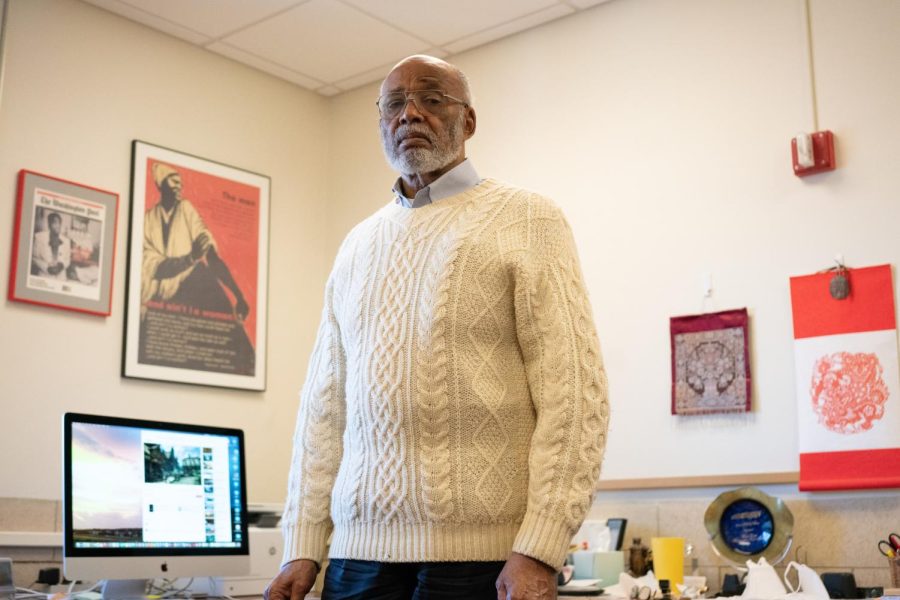Professor Leon Dash discusses decorated journalism career
Leon Dash, professor within the college of media, has shaped his professional career in journalism by telling stories of his many interactions that he has made within his life and career.
Feb 23, 2022
From surviving near-death experiences while reporting on the Angolan Civil War to winning a Pulitzer Prize, Leon Dash, professor in Media, has had a unique path as a journalist.
Shortly after he transferred to Howard University, Dash worked various odd jobs that were unrelated to journalism.
“I got to Washington D.C. a couple of weeks before school and started with jobs that didn’t last too long: working as a janitor and later as a building steam cleaner at night,” Dash said.
Dash said his career in journalism officially began when he visited the offices of New York’s senators. There, he saw an advertisement for a job at The Washington Post. Since he was once the editor of Lincoln University’s student newspaper, Dash was excited.
“I saw a job advertised that morning in The Washington Post for a copy boy on the lobster shift, 6:30 in the evening to 2:30 in the morning,” Dash said. “It turned out perfect for me. Journalism really chose me; I didn’t choose journalism.”
Get The Daily Illini in your inbox!
Dash got his first big break in April 1996. The editor-in-chief at the time offered him a two-year internship at The Washington Post. He quickly advanced in the newsroom.
“I was on staff by December 1967 and after graduating from Howard University in January 1968, I was a staff reporter,” Dash said. “I loved what I was doing. That’s why I say journalism chose me.”
After a few years on the Post’s staff, in the ’70s, Dash received a call from a woman named Xiao who taught international relations at the University of North Texas. Dash said she asked him to go to Africa to report on the Angolan revolution against Portugal.
“She said to me, ‘I’ve been talking to Black reporters, and they all told me you would be willing to do what I want them to do,’” Dash said. “She said to go live with the liberation movement in Africa.”
Dash said he had to illegally sneak into Angola while actively discussing the situation with his editors at The Washington Post. For three months, Dash traveled to different regions on Land Rovers with Angolan rebel forces. During the holidays in 1973, Dash published a series in the Post about his experience reporting on the war.
Upon returning home, Dash visited several universities and spoke about his experience in Africa. During this tour, however, he said he received on official invite from Angola’s military to re-enter the country and report on the guerillas, legally this time.
Dash said no matter what he saw while he was in Africa, he was never scared.
“With the guerillas, I had very protective bodyguards,” Dash said. “Once, I saw one of their attacks on the town and found myself unfearful. I was rather attracted to everything that was going.”
After seven and a half months, Dash left Angola for the last time in 1977. He then published a series called “A Long March in Angola.” This series won Dash the George Polk Award from the Overseas Press Club and the prize in International News Reporting from the Washington-Baltimore Newspaper Guild.
Dash said his time with the guerillas was the highlight of his career. However, Dash wanted to do more.
Previously, alongside another writer in 1972, Dash had written “The Shame of the Prisons,” a work that exposed problems in the American correctional system. In the ’80s, Dash continued his work with prisons.
“I started going into the DC jail in August of ’87 to interview people in the jail system,” Dash said. “I was looking for the underclass families that I wanted to follow.”
Dash selected four families to follow. However, only one was willing to speak.
“The only one willing to talk to me was Rosalie Cunningham,” Dash said. “She was on methadone maintenance (and had) three grandchildren to look after because her youngest daughter was in jail for crack cocaine and six of her children were drug addicted criminals.”
Dash spent four years following Cunningham and her family, observing their day-to-day lives in the poverty of urban America. He recorded his observations in an article. In 1996, the article would turn into a best-selling book titled “Rosa Lee.”
In 1995, Dash won the Pulitzer Prize for Explanatory Journalism for his work with the Cunningham family. Furthermore, a documentary based on Dash’s work won an Emmy Award from the National Academy of Television Arts and Sciences.
When he was 54, Dash said he left the Post when the news outlet shifted interests from long-term investigative news to more conventional reporting.
In March 1997, Dash began looking into teaching. He said that he was considering Duke University, the University of Southern California and the University of Kansas. But ultimately, Dash picked Illinois.
This semester, Dash is teaching JOUR 315: Advanced Public Affairs Reporting, which teaches students to do in-depth reporting on issues of public interest.
“I try to get them to conceptually understand what they can do, what they’re capable of, because many students don’t think they’re capable and I tell them ‘Yes you are,’” Dash said.






